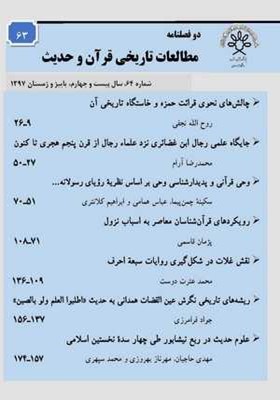ریشههای تاریخی نگرش عین القضات همدانی به حدیث «اطلبوا العلم ولو بالصین»
محورهای موضوعی : تحلیل محتوای متون حدیثی
1 - استادیار دانشگاه علوم و معارف قرآن کریم، دانشکدۀ علوم قرآنی آمل.
کلید واژه: تاریخ تصوف, عین القضات همدانی, اندیشههای غنوصی, رازگرایی,
چکیده مقاله :
صوفیان و فیلسوفان مسلمان در بسیاری از موارد فهمی خلاف ظاهر از روایات ارائه دادهاند. از زمرۀ این قبیل عالمان مسلمان، عین القضات همدانی (مقتول در 525ق) است. او در بحث از روایات مختلف چنین میکند. از جمله، در بحث از روایت اطلبوا العلم ولو بالصین منظور روایت را رفتن به چشمهای به نام صاد برای فرا گرفتن علم حضوری و لدنی میشناساند؛ چشمهای که بهطبع بر معنایی رمزی دلالت میکند. جا دارد بپرسیم ریشههای تاریخی نگرش وی به این روایت چیست. چنان که خواهیم دید، این برداشت ریشه در تفکر گنوسی و رازگرایانۀ او دارد. بر اساس تفکر گنوسی ــ که در بخشی از مسیر انتقال خود از طریق مسیحیت و مانویت به ایران و بهطبع به اسلام ایرانی راه یافته ــ جهان مادی و علم مادی فاقد ارزش است. غنوصیان اصالت را به جهان متافیزیکی میدهند و عین القضات هم از ایشان متأثر است. اندیشۀ رازگرایانۀ دیگری که عین القضات از آن اثر پذیرفته، تفکر افلاطونیان است که با اعتقاد به عالم مُثُل، اصل تمام چیزها را در عالم بالا میدانند و اشیاء مادی را سایه و ظِلّی برای آن درنظر میگیرند. هر چند نگرش عین القضات به حدیث دارای ریشههای تاریخی در خارج از جهان اسلام است، جنبههایی از تفکر عین القضات را میتوان در ادیان مختلف و مکاتب گراینده به تفاسیر باطنی از اسلام خاصّه مذهب تشیع بازدید.
The Sufis and Muslim philosophers have in many cases provided a different understanding of the traditions. Among such Muslim scholars is 'Eyn al-Quzāt Hamidāni (killed in 525 AH). He does so in discussing various traditions. For example, in discussing the narration of "Utlubu al-‘Ilm wa lu Biṣīn" (Seek knowledge, even though it is in China) he says that the meaning of the narrative is to go to a spring called "Ṣād" to learn interior and secret knowledge, a source that implies a secretive meaning. It is appropriate to ask what historical roots existed in his time to cause him to have such attitude to this narrative . As we shall see, this notion is rooted in his Gnostic and mystical thinking. According to the Gnostic thought - partly on the path of its transmission through Christianity and Manoit to Iran and subsequently to Iran after converted to Islam - the material world and material science are worthless. Gnostics give authenticity to the metaphysical world and 'Eyn al-Quzāt was influenced by them as well. Another mysterious thought that 'Eyn al-Quzāt was influenced by is the one presented by Plato, who believed in the universe of the forms and that the principle of all things existed in the higher world and regard material objects as shadows and darkness. Although his viewpoints of hadiths have historical roots outside of the Muslim world, aspects of such beliefs can be viewed in various religions and schools of interest to esoteric interpretations of Shiite Islam in particular.
_||_

